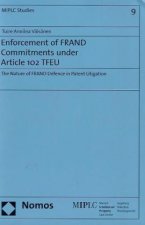
Kód: 06463998
Weaving Intellectual Property Policy in Small Island Developing States
Autor Miranda Forsyth, Sue Farran
There is considerable pressure on Small Island Developing States globally to introduce or to strengthen intellectual property regimes. This pressure comes in a number of forms, including bilateral and multilateral Free Trade Agree ... celý popis
- Jazyk:
 Angličtina
Angličtina - Väzba: Brožovaná
- Počet strán: 280
Nakladateľ: Intersentia Ltd, 2015
- Viac informácií o knihe

90.79 €
Dostupnosť:
50 % šanca Máme informáciu, že by titul mohol byť dostupný. Na základe vašej objednávky sa ho pokúsime do 6 týždňov zabezpečiť.
Máme informáciu, že by titul mohol byť dostupný. Na základe vašej objednávky sa ho pokúsime do 6 týždňov zabezpečiť.Prehľadáme celý svet
Mohlo by sa vám tiež páčiť
-

East Meets Vegan: The Best of Asian Home Cooking, Plant-Based and Delicious
16.98 € -19 % -

CRISIS CARAVAN
16.17 € -19 % -

A Brief History of Video Games
15.26 € -6 % -

Struggle: The Art Of Szukalski
34.37 € -15 % -

Minecraft: Guide to Pvp Minigames
13.54 € -4 % -

Battle Angel Alita Deluxe Edition 4
27.19 € -12 % -

Barcelona
16.27 € -10 % -

Linux Basics For Hackers
32.85 € -19 % -

Voyeur
23.75 € -

That Time I Got Reincarnated as a Slime, Vol. 4 (light novel)
12.83 € -15 % -

National Geographic Greatest Landscapes
33.86 € -17 % -

RHS Botanical Illustration
37.91 € -17 % -

Marvel Powers of a Girl
14.45 € -20 % -

Introductory Econometrics for Finance
65.92 € -

Binging With Babish
32.25 € -

Fundamentals of Software Architecture
68.85 € -12 % -

Wranglestone
9.29 € -28 % -

Destiny Grimoire Anthology, Volume III: War Machines
28.71 € -

Identites locales
100.30 € -

The Great Gatsby
8.38 € -

Film and Risk
49.23 € -

I Love You to the Moon and Back
7.78 € -17 % -

US-Japan Trade Friction
76.13 € -

Truth in Translation
100.60 € -

Sacred Prostitute
20.62 € -23 % -

You Can't Take An Elephant On the Bus
8.28 € -24 % -

Thaddeus Strode
34.88 € -

Praying for Sheetrock
19.91 € -6 % -

Confederate Legend
36.39 € -

Eye on Korea
45.09 € -

Macroprudential frameworks in Asia
36.80 € -

Quantum Tarot
35.28 € -

Cat Lovers' Coloring Book
4.44 € -5 % -

Omega Highlights
28.81 € -7 % -

Art Quilt Maps
29.31 € -

Neurochemistry in Clinical Application
69.96 € -

Theology on the Menu
215.07 € -

DBT Made Simple
36.80 € -19 % -

Urban Planning And The Development Process
88.27 € -

Jiří Jilovský
2.32 € -3 % -

Inspirujące bajki
3.43 € -26 % -

Legends Live: Albert Mangelsdorff Quintett
21.12 €
Darujte túto knihu ešte dnes
- Objednajte knihu a vyberte Zaslať ako darček.
- Obratom obdržíte darovací poukaz na knihu, ktorý môžete ihneď odovzdať obdarovanému.
- Knihu zašleme na adresu obdarovaného, o nič sa nestaráte.
Informovať o naskladnení knihy
Zadajte do formulára e-mailovú adresu a akonáhle knihu naskladníme, zašleme vám o tom správu. Postrážime všetko za vás.
Viac informácií o knihe Weaving Intellectual Property Policy in Small Island Developing States
Nákupom získate 227 bodov
 Anotácia knihy
Anotácia knihy
There is considerable pressure on Small Island Developing States globally to introduce or to strengthen intellectual property regimes. This pressure comes in a number of forms, including bilateral and multilateral Free Trade Agreement negotiations and development assistance programmes such as those of the World Intellectual Property Organisation. The aim of this book is to offer a competing model of intellectual property policy using the Pacific Islands as a case study. This competing model is one based on local conceptions of culture and indigenous understandings about use, knowledge and transfer of intangible property. Adopting such a base as a starting point will enable the weaving together of multiple regulatory strategies to facilitate the transfer of knowledge, stimulate and reward innovation and creativity, and protect rights over traditional knowledge in ways that have meaning and resonance for local populations. Elements of western intellectual property frameworks can also form important strands in intellectual property policies. However, these elements should be incorporated, and possibly reinterpreted, within the local framework. The approach advocated in this book opens up a number of different roads for intellectual property policy. First, it encourages the exploration of non-state regulatory mechanisms, such as customary norms and institutions, community protocols, and also membership of international NGOs, in regulating the use of intellectual property. In most Pacific Island countries there is little state capacity to implement and police intellectual property laws and so creative use should be made of the possibilities offered by non-state structures. Second, it suggests centralising culture and the protection of traditional knowledge at the heart of intellectual property policy, rather than treating it as a secondary issue to be dealt with by sui generis legislation. Here, traditional knowledge forms the basis of culture and development and cannot and should not be separated from modern or 'scientific' notions of creativity and innovation. A pragmatic incremental approach to intellectual property policy development is also advocated, requiring countries to thoroughly assess the advantages and disadvantages of any new intellectual property law within their local context, to consider how to adaptively implement this in a way suited to the local context, as well as to realistically assess the state's capacity for enforcement. Finally, the book challenges a number of claims made about intellectual property law and development, demonstrating that a far more fine-grained analysis of the nexus between the two is required than currently offered by the WIPO Development Agenda.
 Parametre knihy
Parametre knihy
Zaradenie knihy Knihy po anglicky Law Laws of Specific jurisdictions Intellectual property law
90.79 €
- Celý názov: Weaving Intellectual Property Policy in Small Island Developing States
- Autor: Miranda Forsyth, Sue Farran
- Jazyk:
 Angličtina
Angličtina - Väzba: Brožovaná
- Počet strán: 280
- EAN: 9781780682259
- ISBN: 9781780682259
- ID: 06463998
- Nakladateľ: Intersentia Ltd
- Hmotnosť: 474 g
- Rozmery: 240 × 161 × 18 mm
- Dátum vydania: 17. September 2015
Obľúbené z iného súdka
-

Intellectual Property: A Very Short Introduction
11.42 € -19 % -

Copyright's Highway
29.01 € -

European Intellectual Property Law
65.01 € -3 % -

Copyright Law for Librarians and Educators
79.06 € -

European Trade Mark Law
549.37 € -

Cambridge Handbook of Copyright in Street Art and Graffiti
195.65 € -14 % -

Intellectual Property Management - A Guide for Scientists, Engineers, Financiers and Managers
85.33 € -

Law and Economics of Intellectual Property in the Digital Age
73.20 € -

Nature of Copyright
45.59 € -

Intellectual Property in Electronics and Software
183.72 € -

Law Express: Intellectual Property Law
21.73 € -

Confusion Test in European Trade Mark Law
278.67 € -

gesti n de la propiedad intelectual en los museos
34.37 € -

Putting Intellectual Property in its Place
236.51 € -

European Community Trade Mark
483.44 € -

IP and Other Things
184.53 € -

Digital Markets Act Digital Services Act
23.25 € -

Intellectual Property of Nations
52.37 € -

Intellectual Property Overlaps
258.96 € -

Information Doesn't Want to Be Free
15.97 € -2 % -

Balancing Copyright Law in the Digital Age
69.96 € -

Film Copyright in the European Union
218.71 € -

Originality in EU Copyright - Full Harmonization through Case Law
131.14 € -10 % -

European Union Design Law
478.59 € -

Intellectual Property, Human Rights and Development
131.14 € -10 % -

Advanced Introduction to International Intellectual Property
25.67 € -10 % -

Search Engine Freedom
356.33 € -

European Trademark Law
386.06 € -

Supplementary Protection Certificates
277.86 € -

Art and Authority
112.43 € -

Understanding Copyright
68.24 € -

Intellectual Property Law and Innovation
152.38 € -

Intellectual Property and Emerging Technologies
189.69 € -10 % -

Patent Failure
49.23 € -

SAGE Handbook of Intellectual Property
160.06 € -10 % -

Drafting Patent and Know-How Licencing Agreements
270.08 € -

Intellectual Property
202.43 € -12 % -

New Intellectual Property Issues
168.25 € -12 % -

Intellectual Property in the Global Trading System
137.81 € -

Biopatent Law: Patent Strategies and Patent Management
106.97 € -

Patent Intensity and Economic Growth
170.48 € -

Chemist's Companion Guide to Patent Law
160.06 € -

Litigation@Google
17.89 € -

Exclusive Rights
22.14 € -

Resolution of Cultural Property Disputes
257.54 € -

Pocket Legal Companion to Copyright
19.91 € -

Copyfight
51.66 € -

Enforcement of FRAND Commitments under Article 102 TFEU
26.79 € -

Emerging Intellectual Property Paradigm - Perspectives from Canada
151.06 € -9 %
Osobný odber Bratislava a 2642 dalších
Copyright ©2008-24 najlacnejsie-knihy.sk Všetky práva vyhradenéSúkromieCookies


 21 miliónov titulov
21 miliónov titulov Vrátenie do mesiaca
Vrátenie do mesiaca 02/210 210 99 (8-15.30h)
02/210 210 99 (8-15.30h)